#rwrb zine
Text
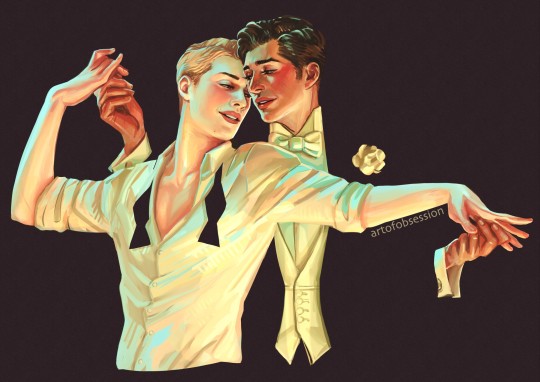
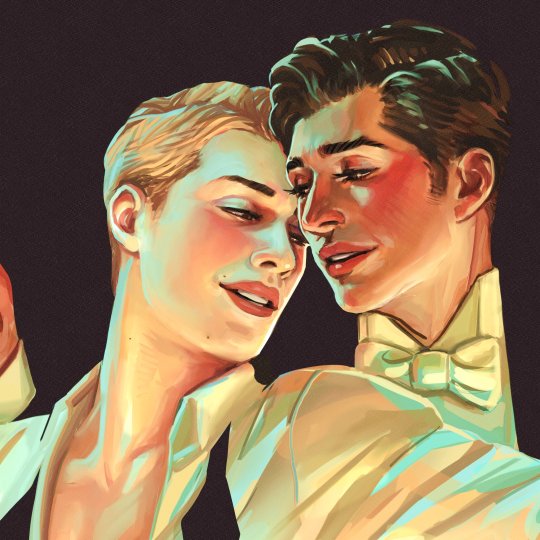
inspired by JC Leyendecker
--
(Available as a print!)
my piece for the H&A MUSEUM: A RWRB Classics Zine
#rwrb#firstprince#rwrb fanart#henry fox#alex claremont diaz#red white and royal blue#rwrb book#rwrb zine#art of mine#jc leyendecker
2K notes
·
View notes
Text
RWRB: The Movie
Even before RWRB started climbing the bestseller lists back in 2019, the word was out: this one is going to be big! So Hollywood studios immediately began clamoring for movie rights, which Amazon Prime won in a sealed-bid auction. We fans then filled the internet with suggested cast lists—I was going to say, “none of which even came close to naming the actors eventually chosen, especially the principal leads.” But then a friend reminded me that he had actually suggested Rachel Hilson as Nora from the start, and (don’t read this next bit, Nick and Taylor), “I also had some great suggestions for Alex and Henry, which would have been perfect if they had gone for younger actors closer to the ages the novel specifies.” I sit corrected.
Meanwhile, we settled in to wait for an announcement that the movie was starting production, with a fervor unmatched by even the most rabid fans of the Left Behind series looking for the Second Coming. And we waited … and we waited … and we waited. First-time director Matthew Lopez, a Tony award-winning playwright who also wrote most of the script, seemed to be taking his sweet old time casting the film (though I suspect that once Nicholas Galitzine threw his hat into the ring to play Henry, no one else was even considered). And there matters sat. It didn’t take quite as long to start filming as Jesus has taken to return, but at times, it sure felt like it.
Then, with a rustling of angels’ wings and a blast from golden trumpets, the announcement came: the film had been completely cast and shooting was about to begin! Aside from the two leads, Matthew gave few particulars about who was playing whom, and almost no candid shots of scenes being filmed showed up on the web. There was a bit of flack when Rachel Hilson was announced as Nora, because of the book’s only Jewish character becoming Black. And when Queen Elizabeth II happened to die three weeks after principal shooting ended, people began speculating about the possibility of Matthew being psychic, since he had chosen to replace the novel’s Queen Mary with King James III. Obviously, it didn’t take Madame Cleo to predict that a 96-year-old lady might not survive much longer and that a male monarch would occupy the throne by the time of the movie’s premiere. But in the midst of all the mystery surrounding the film, we needed to talk about something.
Then shortly after shooting wrapped, Nicholas Galitzine was asked how faithful the movie was going to be to the novel. Somewhat nervously, I imagine (he later confessed in an interview with GQ that he never actually finished reading it, so no doubt he was a bit hazy about details), he cautioned us not to expect a carbon copy of the novel, but instead to treat the two as “entirely separate.” He then added, “I just hope that people will think of this as a fun movie.”
Sorry, Nick. RWRB is not a fun movie. Yes, like the novel, it is funny in spots (and Matthew’s script, which I felt actually improved on some of CMQ’s lines, is also remarkably faithful to the original in its general outline and inclusion of certain iconic scenes—far more than most movie adaptations). But the film is mainly concerned with serious issues, and aside from occasional lapses into preachiness, it treats these issues with sincerity, tenderness, and genuine feeling. And this is in no small part due to the performance of Nicholas Galitzine himself.
I find Nick Galitzine to be one of the most amazingly attractive human beings I have ever seen. It’s not just because of his handsome face; my admiration springs from his obvious innate decency, his endearingly goofy sense of humor, and his undeniable talent. There was no need for him to admit that he never finished the book—it’s not like we could have checked—but when asked, he told the truth, because he is an honest man. When the writer from GQ whispered that some other diners at the restaurant where they were meeting were getting irritated because Nick was being too noisy, he immediately got up on his crutches (he had chipped a bone in his ankle in an accident on the set of his latest project, Mary and George) and tottered over to apologize, an all-too rare example of consideration and good manners in this post-Trump world. When teased about his habit of calling everyone “mate” and hailing them as if they were long-lost BFF’s, Nick replied with a laugh, “Everyone is my friend—I’m just very excited to see them! I’m very enthusiastic!” I’m sure that truer words were never spoken.
Though Henry was easy to cast, the hunt for Alex took rather longer, because Matthew was searching for someone who demonstrated just the right chemistry with Nick. Then a thirty-year-old actor named Taylor Zakhar Perez put himself forward (too old, I would have thought, to play the 21-year-ol Alex; plus, at 6’2”, he was actually two inches taller than Nick, and CMQ had made a major plot point out of Henry’s superior height). But when Nick and Taylor first met, Matthew was called away for a few minutes, and he came back to find them talking nineteen to the dozen like they were old friends. At that moment, Matthew knew he had found his Alex. The possible objections were easily dealt with (Alex is no longer a college senior, but instead is now in law school, so he could easily be in his mid-twenties; and clever camera angles make Nick look taller. The script also creates a running joke out of Alex continually insisting that Henry cannot possibly be 6’2” as his fact sheet claims; and when they’re standing side-by side, Henry accuses Alex of wearing lifts. Alex’s look of confused dismay makes us actually wonder). They are perfectly matched, and the result is screen magic.
I found Taylor to be a complete revelation. His last movie had been a quickly-forgotten (luckily for him) bomb called One Up, in which Taylor’s lines were mostly restricted to comments like, “No, girls can’t join our team! Girls can never compete with men in the field of …” (wait for it) “competitive gaming!” Huh? We’re not talking about professional wrestling or weight-lifting—we’re talking about computer games. Moreover, countless studies have shown that women’s reflexes are quicker than men’s, their brains are proportionately larger, and that men’s only real superiority is upper body strength. I thought that such ignorant sexism as Taylor’s character in One Up conveys was a thing of the past, but in a world where women can lose the right to control their own bodies at the stroke of a pen, maybe not.
Though Taylor has never before played so major a part (that I’m aware of), he acquits himself admirably here. From the moment Alex tries to persuade Nora to ditch the reception and “go do touristy things,” the role of Alex is obviously in just the right hands. As it turns out, Nora might have done well to accept Alex’s suggestion, because he gets drunk at the reception and manages to create an international incident. And I must say, I very much enjoyed Henry and Alex’s interaction at the reception. Not only was I finally able to visualize the exact sequence of events leading to the disaster with the cake; I loved Henry’s fury at Alex’s dismissal of the proper use of titles (more about this below). It may make Henry look like a snobbish prig (which is certainly how Alex sees him), but Henry doesn’t care what Alex thinks. It also shows just how far Alex can goad him. For a royal, displaying such fury is even worse than making a scene, because royals are supposed to smother their feelings and appear cool, calm, and collected, no matter how trying the circumstances. Alex may be the first person who has ever been so lippy with Henry, and he really gets under Henry’s skin by doing so. (Which he will later do in a much more literal manner ….)
Which leads me to the BIG question we all wondered about: did Nick and Taylor’s offscreen friendship translate into SIZZLING sex onscreen? Well—no. And that’s fine by me. Any time I want to watch porn, there are any number of sites I could visit (or—ahem—so they tell me). Instead, these sex scenes give us poetry—aching, tender, romantic, and beautiful, allowing us the chance to peek into the depth of the characters’ intimacy, something made possible only by the actors’ consummate artistry. (Sorry—I couldn’t resist that one.)
Their first sexual interaction happens at the New Year’s Eve party, where they spend the entire evening talking and laughing together in a way that completely excludes everyone else. But then while everyone is sharing kisses at midnight (and several beautiful women make a beeline for Alex), Alex notices the (unkissed) Henry staring at him, heartbreak writ large on his face. Henry grabs a magnum of champagne and disappears, so Alex tracks him into the frozen Rose Garden. Critics have commented that this scene is detectably CGI, but come on, people—the movie was filmed during the summer, and it’s not like they were going to fly cast and crew to South America for a true wintry landscape. Besides, the actors’ talent made them look cold, which more than met the needs of the scene.
The ensuing kiss is straight out of CMQ, and I thought Alex’s reaction to Henry’s grab-and-smooch is particularly good. At first he seems startled (though not shocked), but then he plainly starts getting into it. It is Henry who breaks away, with a look of shock and terror as he realizes what he has just done. Without a single word, Nick is able to show us exactly what Henry must be thinking: Oh, my God! I let the mask slip—again! How does this bloke always make me do exactly what I was brought up not to do—expose myself by showing my real feelings? Christ! I need to get out of here!
Now it’s up to Taylor to show Alex’s reaction to the incident. In the movie, he seems not to feel much more than mild surprise, and a vague curiosity about whether Henry might be gay. But in the book, Alex goes into full-on gay crisis mode because of his body’s immediate reaction, and he develops even more of an all-consuming obsession with Henry. CMQ devotes twenty pages to this issue, one which all LGBT’s must eventually face (and twenty pages is actually getting off easy—in my case, accepting my bisexuality took decades). But since the movie’s Alex readily acknowledges his male lovers, enjoying Henry’s kiss isn’t an issue for him at all. The only complication he now faces is coming out to his parents, though I’m sure they figured out that their son was bisexual long ago.
Then comes the White House dinner and the Red Room scene, after which Alex orders Henry to “come to my room at midnight, where I am going to do very bad things to you.” My aforementioned friend (the one with the cast list) points out that Henry unbuttons Alex’s shirt and begins kissing down his chest and stomach, and Alex leans back with a look of gratified pleasure, but then at the end of the scene, Henry is still fully dressed. (Didn’t Alex reciprocate?) Henry then invites Alex to a polo match back in the UK, at which we see the guys kissing and Alex pushing Henry onto his back and reaching down to remove Henry’s belt, and … that’s as graphic as it gets. Matthew rightly protested the movie’s “R” rating, since aside from a couple of f-bombs and a brief shot of Taylor’s bare backside, that’s it. An “R” rating? I suspect that it’s studio nervousness about a potential homophobic reaction, and if the execs are that squeamish, why did they buy the movie rights in the first place?
The final sex scene is extremely well done. Henry begins by telling Alex that he wants to make love to him, to which Alex uncomfortably replies, “Make love? Who says that anymore?” Well, maybe Henry didn’t want to scare you off, Alex, by using the same words as he does in the book: “Please—I need you to fuck me.” But obviously, Alex intuits that this is exactly what Henry wants, because Alex says nervously, “Um—I’ve never—” to which Henry smiles and says, “Don’t worry—I went to an English boys’ boarding school,” which is a far more likely scenario for Henry to have been initiated into gay sex than a virginal 17-year-old Henry being seduced by one of his older brother’s friends.
The two lovers gaze at each other, and then they gently, almost reverently, begin to touch. It made me think of times at night when my wife and I are in bed, and I look at her asleep on the next pillow, and I touch her in exactly this way. My heart feels like it will burst, and wonder floods me as I realize that this woman, whom I have loved for all these years, actually loves me back. Can the human heart ever experience anything more wonderful than such a realization? The same knowledge shines out of the men’s eyes in this scene—I love him, and he loves me. Then the touching becomes more intense, and as the scene progresses, without a single word or sound, Nick conveys the exact moment when Taylor seemingly enters him, and precisely when the pain of initial penetration tips over into pleasure. I’ll say it again: this guy is amazing. Ever since I first started watching Nick’s movies, I have said that he can communicate more in ten seconds of silence than other actors can manage in a two-page monologue, and that is exactly what he does here. (And he still has no acting awards? I mean, really?)
Alex acknowledges to himself that making love is exactly what he has been doing with Henry all along, but by trying to share this realization he only succeeds in scaring Henry off. Henry begins deflecting every time Alex brings up their future together, a future which Henry believes to be impossible. Alex tells him, “I want to see you at a barbecue stand with sauce smeared all over your mouth, so I can lick it off,” to which Henry replies, “Don’t they have napkins in Texas?” Alex begins talking about spending time together after the election, when “we can be naked all day, and walk down the street holding hands” (presumably after they’ve put some clothes on). I loved watching Taylor’s face as he nervously suggests their eventually going public, and tries to make his declaration of love. And (as always), Nick perfectly conveys Henry’s troubled emotions, as Henry cuts Alex off by jumping into the lake. The fear on Henry’s face as he submerges himself in the water is a perfect visual metaphor for the doubts and terrors in which he is drowning.
And make no mistake—these fears are well-grounded, and very real. Henry was born into a world where nothing matters more than hierarchy and the strict rules which govern it—thus his insistence that Alex address him correctly as “Your Royal Highness” rather than “Your Majesty,” a title reserved the monarch alone. Priggish? Pretentious? Maybe—but take away the outward forms which maintain this artificial world, and who is Henry? And if Henry insists on being himself and steps outside the royal system, the punishment will be both immediate and severe.
Prince Harry and his wife were still newlyweds expecting their first baby while CMQ was writing the novel. No one could have predicted that the devil’s bargain between the Palace and the media (which always demands a villainous royal to skewer before they publish praise about a more important one) would lead to the vicious unpopularity Meghan Markle currently suffers. The written abuse heaped upon her (greatly assisted by social media) became so severe that she firmly believes it led directly to the loss of their second child. So they felt they had to flee the country if they were going to save their marriage and their family.
But as Prince Harry describes in his memoir, Spare, they soon discovered that for doing so, within twenty-four hours of their arrival in this hemisphere, his funds were cut off and they were officially evicted from both their royal residences. The very next morning, his security detail was taken away, leaving them homeless and unprotected in a world of crazy stalkers (from whom Meghan had been receiving death threats) and intrusive paparazzi. Harry also found that a private security firm would cost him roughly six million dollars a year, which would soon eat up every penny his mother had left him. Fortunately for Harry and Meghan, friends stepped into the breach to help them, but except for a very few, his family has turned on him with silent fury and stony faces ever since. Even Prince Andrew, convicted of molesting an underage female and who must register as a sex offender anywhere he goes for the rest of his life, got more generous treatment than this. All Harry did was put his love for his wife and children above royal duty, but for doing so he has been cast into the outer darkness. And for the sin of claiming his own right to fall in love with a brown-skinned American, Henry knows he would suffer the same fate.
But RWRB is a fairy tale, so of course everything works out fine in the end. The election which Alex’s forced outing has put into doubt ends with Ellen’s victory due to a strategy devised by Alex himself. Despite intense pressure from the royal family, Henry insists on staying with Alex and acknowledging their true feelings for each other, and the entire world rallies around them. It is a triumph for love and tolerance over “the stifling suffocation of heteronormative conformity.” (I wish I didn’t have to put that line into quotation marks, but no one who knows me would ever believe that I had come up with such an erudite and well-turned phrase on my own.)
I enjoyed the film immensely. I thought the actors were top-drawer, as was Matthew’s adaptation and direction. So what didn’t I like? The watering-down of the certain characters for one, but above all, the elimination of others, especially Alex’s sister June. Please bear with me, though, because I think I have a glimmer of understanding as to why Matthew might have done this. And with his love for the book, I am sure that he did not arrive at his decisions lightly.
Let’s start with the character of Nora. In the book, she is someone “with a computer for a brain” who adopts the online persona of “a depressed lesbian poet who meets a hot yoga instructor in a speakeasy and is now marketing her own line of hand thrown fruit bowls.” But in the film, she becomes little more than a walk-on, and her brilliant, prickly presence gets watered down into a warm and loving sister surrogate (necessary since June got axed—why include June when Nora can function for both?). Now that Nora is Alex’s supportive older sister, obviously there’s no hint of their past relationship from the book, in which “they just had to fuck to get it out of the way.” And without June, there’s also no need for a lesbian subplot. In the process, almost all of Nora’s spunkiness gets lost, and once the reception scene and the discussion with Alex about Henry’s New Year’s Eve kiss are over, she has nothing much to do but smile from the sidelines as she pairs up with Pez (who is also reduced to almost nothing—Henry’s incredibly wealthy, highly amusing and sexually ambiguous best friend barely has two lines). By reducing these characters, the movie loses the interest they both bring (Nora in particular).
This sort of character reduction is not limited to Nora and Pez. Many remaining characters get sanitized as well, if not entirely deleted. The abrasive Zahra who threatens to “staple Alex’s dick to his leg if it’ll keep it in his pants” morphs into a wisecracker who serves the essential function of calling Alex to account and dealing out the discipline he so obviously requires, but who always remains a friend. She thereby becomes much more likable—I loved the original character, but I used to wonder how someone so rude could have made it so far in politics—but in the process she becomes much more bland, and we lose most of her salty, prickly humor.
The salty-tongued Ellen, who sometimes uses her children as props and who ruthlessly cuts Alex loose when he threatens to become a campaign liability, gentles down into mere exasperated bossiness when dealing with her only child, and in the process becomes a fairly minor character. She shows none of the grit and determination that would have led her from her mother’s bar all the way to the White House. She is also still married to Alex’s father, Oscar Diaz, who has morphed from an important California senator into an undistinguished Congressman whose speeches everyone (but Alex) ignores. With Oscar and Ellen still together, the character of June loses one more necessary function: supporting and protecting Alex in the wake of their parents’ divorce, as well as her habit of challenging him for the behavior she believes may be fallout from Alex’s still-conflicting loyalties to his warring parents. But in the movie, the only hint of conflict between Mom and Dad is Oscar asking his son not to tell his mother that Oscar has been smoking out on the Truman Balcony.
And then there’s Rafael Luna. His abrasive, mentoring character gets deleted entirely, and his seeming betrayal (which causes Alex such agonized soul-searching) gets replaced with actual betrayal by a shifty investigative reporter. Luna goes undercover to expose a sexual predator and to prevent such a person from entering the White House (if only there had been this sort of double agent on the Trump campaign!). But in the movie, the guys get outed because a reporter named Miguel, a former lover of Alex’s, becomes jealous when Henry and Alex go off together at the DNC. I loved the cameo by Joy Reid (as I also loved the cameos by Rachel Maddow—and Matthew, while you were at it, why didn’t you also get Steve Kornacki?) as she pushes the reporter to explain why he had done such an underhanded thing. With all the hypocrisy and smug sanctimoniousness typical of his breed, the reporter gives a BS answer about “the public’s right, and need, to know such things about the people they elect,” which Joy immediately challenges by pointing out that (a) Alex has not been elected to anything, and (b) he has a perfect right to keep his private life just that—private.
So why did Matthew make all these changes? I think it may be for one simple reason: anyone adapting a novel for the screen must first identify the elements that made the original so popular, and, since we’re talking Hollywood, those which are also the most marketable. Every word must somehow advance the main storyline, and all subplots that distract from it must be ruthlessly eliminated. Multiple characters get condensed into one who can represent them all. There has to be a conflict engineered by the villain of the piece, but the elaborate undercover plot organized by the Richards campaign would have taken too much screen time. So it gets replaced by one which might be summarized in ten words: “Hell hath no fury like that of a lover scorned.” Of course, in a romcom, the screenplay must finally lead to a happy ending, and here we get two: in England, the lovers wave to an adoring public from the Buckingham Palace balcony; and in the US, Ellen finds out that she’s been reelected even as she and Zahra are composing her concession speech. Then Ellen, Oscar, Alex, and Henry wave at adoring supporters cheering Ellen’s victory.
RWRB the novel is only marginally a romcom; it is really a coming-of-age story, its message one of self-acceptance through self-awareness. This is what makes it so wildly popular among the YA audience at whom it is aimed, since adolescence is the time when the struggle to know and acknowledge who we really are is the most difficult. Just before the election, Nora tells Alex that he has no reason to be afraid of people’s reactions to his bisexuality; all he has to do to cement his popularity is to “Be Alex.” It’s good advice for all of us: difficult though it often is, our only real path to a full and productive life is by knowing and accepting ourselves as we are. And as a wise woman once told me, being yourself is a lot easier than being anyone else.
But self-acceptance is a particularly thorny issue for LGBT’s, even if our mothers are liberal Democrats like Ellen Claremont and our fathers are “patron saints of unisex bathrooms” like Oscar Diaz. As members of the culture into which we are born, from our very first awareness we know that there is something different about us. Something which our society teaches us is loathsome and contemptible, and which will inevitably lead to our eternal damnation. This is a pretty tough concept to handle, and we’re forced to confront it even before we enter preschool. But it’s not an issue the movie chooses to address: instead, it focuses on almost exclusively the developing romance between the two principals. This shoves the film’s entire weight onto Nick and Taylor, but fortunately these young men both have broad shoulders, and their talent is more than able to carry it. That talent also keeps us rooting for their characters’ happy ending, and if some characters and most of the subplots get cut, well, you have to break a few eggs to make an omelet.
So. Do I love the book RWRB? Of course I do—and how I wish it had been around when I was struggling with my issues as a young bisexual man in the 1970’s, since it would have saved me years of shame and pointless suffering. I would then have been much more ready for my own happy ending when Bobbie eventually entered my life. And do I love the movie RWRB? I totally do—I’m always up for a romance, and that is what Matthew, Nick, and Taylor have given us. In some ways, I actually prefer the movie (even though I know that saying this may lead to the RWRB police showing up at my doorstep to confiscate my “History, Huh?” T-shirt). You see, there’s one big problem with publishing a book with such a current, up-to-the-minute feel and format: it quickly becomes about as glossy and stylish as last year’s slang, and so when the Commemorative Edition came out in 2022, I found it curiously dated (the best part, for me, was its illustrations by Venessa Kelley). I think the movie will age a lot better, because with only minor alterations, it could be adjusted to almost any era—it’s not tied nearly so closely as is the book to the Gen Z / Millennial generation.
But to love both book and film, one has to accept the essential correctness of Nick’s original analysis: they are two separate entities, or, if you will, two sides of the same coin. One side is self-awareness and self-acceptance eventually leading to true love, and the other is true love which can only be enjoyed by reconciling societal expectations with personal integrity. So I find the book and the movie equally wonderful, just different. And I treasure them both.
#rwrb zine#vkelleyart gallery#nicholas galitzine#taylor zakhar perez#rwrb cast#red white and royal blue movie#matthew lopez#alex claremont diaz#henry fox mountchristen windsor
20 notes
·
View notes
Text
RWRB: The Movie
Even before RWRB started climbing the bestseller lists back in 2019, the word was out: this one is going to be big! So Hollywood studios immediately began clamoring for movie rights, which Amazon Prime won in a sealed-bid auction. We fans then filled the internet with suggested cast lists—I was going to say, “none of which even came close to naming the actors eventually chosen, especially the principal leads.” But then a friend reminded me that he had actually suggested Rachel Hilson as Nora from the start, and (don’t read this next bit, Nick and Taylor), “I also had some great suggestions for Alex and Henry, which would have been perfect if they had gone for younger actors closer to the ages the novel specifies.” I sit corrected.
Meanwhile, we settled in to wait for an announcement that the movie was starting production, with a fervor unmatched by even the most rabid fans of the Left Behind series looking for the Second Coming. And we waited … and we waited … and we waited. First-time director Matthew Lopez, a Tony award-winning playwright who also wrote most of the script, seemed to be taking his sweet old time casting the film (though I suspect that once Nicholas Galitzine threw his hat into the ring to play Henry, no one else was even considered). And there matters sat. It didn’t take quite as long to start filming as Jesus has taken to return, but at times, it sure felt like it.
Then, with a rustling of angels’ wings and a blast from golden trumpets, the announcement came: the film had been completely cast and shooting was about to begin! Aside from the two leads, Matthew gave few particulars about who was playing whom, and almost no candid shots of scenes being filmed showed up on the web. There was a bit of flack when Rachel Hilson was announced as Nora, because of the book’s only Jewish character becoming Black. And when Queen Elizabeth II happened to die three weeks after principal shooting ended, people began speculating about the possibility of Matthew being psychic, since he had chosen to replace the novel’s Queen Mary with King James III. Obviously, it didn’t take Madame Cleo to predict that a 96-year-old lady might not survive much longer and that a male monarch would occupy the throne by the time of the movie’s premiere. But in the midst of all the mystery surrounding the film, we needed to talk about something.
Then shortly after shooting wrapped, Nicholas Galitzine was asked how faithful the movie was going to be to the novel. Somewhat nervously, I imagine (he later confessed in an interview with GQ that he never actually finished reading it, so no doubt he was a bit hazy about details), he cautioned us not to expect a carbon copy of the novel, but instead to treat the two as “entirely separate.” He then added, “I just hope that people will think of this as a fun movie.”
Sorry, Nick. RWRB is not a fun movie. Yes, like the novel, it is funny in spots (and Matthew’s script, which I felt actually improved on some of CMQ’s lines, is also remarkably faithful to the original in its general outline and inclusion of certain iconic scenes—far more than most movie adaptations). But the film is mainly concerned with serious issues, and aside from occasional lapses into preachiness, it treats these issues with sincerity, tenderness, and genuine feeling. And this is in no small part due to the performance of Nicholas Galitzine himself.
I find Nick Galitzine to be one of the most amazingly attractive human beings I have ever seen. It’s not just because of his handsome face; my admiration springs from his obvious innate decency, his endearingly goofy sense of humor, and his undeniable talent. There was no need for him to admit that he never finished the book—it’s not like we could have checked—but when asked, he told the truth, because he is an honest man. When the writer from GQ whispered that some other diners at the restaurant where they were meeting were getting irritated because Nick was being too noisy, he immediately got up on his crutches (he had chipped a bone in his ankle in an accident on the set of his latest project, Mary and George) and tottered over to apologize, an all-too rare example of consideration and good manners in this post-Trump world. When teased about his habit of calling everyone “mate” and hailing them as if they were long-lost BFF’s, Nick replied with a laugh, “Everyone is my friend—I’m just very excited to see them! I’m very enthusiastic!” I’m sure that truer words were never spoken.
Though Henry was easy to cast, the hunt for Alex took rather longer, because Matthew was searching for someone who demonstrated just the right chemistry with Nick. Then a thirty-year-old actor named Taylor Zakhar Perez put himself forward (too old, I would have thought, to play the 21-year-ol Alex; plus, at 6’2”, he was actually two inches taller than Nick, and CMQ had made a major plot point out of Henry’s superior height). But when Nick and Taylor first met, Matthew was called away for a few minutes, and he came back to find them talking nineteen to the dozen like they were old friends. At that moment, Matthew knew he had found his Alex. The possible objections were easily dealt with (Alex is no longer a college senior, but instead is now in law school, so he could easily be in his mid-twenties; and clever camera angles make Nick look taller. The script also creates a running joke out of Alex continually insisting that Henry cannot possibly be 6’2” as his fact sheet claims; and when they’re standing side-by side, Henry accuses Alex of wearing lifts. Alex’s look of confused dismay makes us actually wonder). They are perfectly matched, and the result is screen magic.
I found Taylor to be a complete revelation. His last movie had been a quickly-forgotten (luckily for him) bomb called One Up, in which Taylor’s lines were mostly restricted to comments like, “No, girls can’t join our team! Girls can never compete with men in the field of …” (wait for it) “competitive gaming!” Huh? We’re not talking about professional wrestling or weight-lifting—we’re talking about computer games. Moreover, countless studies have shown that women’s reflexes are quicker than men’s, their brains are proportionately larger, and that men’s only real superiority is upper body strength. I thought that such ignorant sexism as Taylor’s character in One Up conveys was a thing of the past, but in a world where women can lose the right to control their own bodies at the stroke of a pen, maybe not.
Though Taylor has never before played so major a part (that I’m aware of), he acquits himself admirably here. From the moment Alex tries to persuade Nora to ditch the reception and “go do touristy things,” the role of Alex is obviously in just the right hands. As it turns out, Nora might have done well to accept Alex’s suggestion, because he gets drunk at the reception and manages to create an international incident. And I must say, I very much enjoyed Henry and Alex’s interaction at the reception. Not only was I finally able to visualize the exact sequence of events leading to the disaster with the cake; I loved Henry’s fury at Alex’s dismissal of the proper use of titles (more about this below). It may make Henry look like a snobbish prig (which is certainly how Alex sees him), but Henry doesn’t care what Alex thinks. It also shows just how far Alex can goad him. For a royal, displaying such fury is even worse than making a scene, because royals are supposed to smother their feelings and appear cool, calm, and collected, no matter how trying the circumstances. Alex may be the first person who has ever been so lippy with Henry, and he really gets under Henry’s skin by doing so. (Which he will later do in a much more literal manner ….)
Which leads me to the BIG question we all wondered about: did Nick and Taylor’s offscreen friendship translate into SIZZLING sex onscreen? Well—no. And that’s fine by me. Any time I want to watch porn, there are any number of sites I could visit (or—ahem—so they tell me). Instead, these sex scenes give us poetry—aching, tender, romantic, and beautiful, allowing us the chance to peek into the depth of the characters’ intimacy, something made possible only by the actors’ consummate artistry. (Sorry—I couldn’t resist that one.)
Their first sexual interaction happens at the New Year’s Eve party, where they spend the entire evening talking and laughing together in a way that completely excludes everyone else. But then while everyone is sharing kisses at midnight (and several beautiful women make a beeline for Alex), Alex notices the (unkissed) Henry staring at him, heartbreak writ large on his face. Henry grabs a magnum of champagne and disappears, so Alex tracks him into the frozen Rose Garden. Critics have commented that this scene is detectably CGI, but come on, people—the movie was filmed during the summer, and it’s not like they were going to fly cast and crew to South America for a true wintry landscape. Besides, the actors’ talent made them look cold, which more than met the needs of the scene.
The ensuing kiss is straight out of CMQ, and I thought Alex’s reaction to Henry’s grab-and-smooch is particularly good. At first he seems startled (though not shocked), but then he plainly starts getting into it. It is Henry who breaks away, with a look of shock and terror as he realizes what he has just done. Without a single word, Nick is able to show us exactly what Henry must be thinking: Oh, my God! I let the mask slip—again! How does this bloke always make me do exactly what I was brought up not to do—expose myself by showing my real feelings? Christ! I need to get out of here!
Now it’s up to Taylor to show Alex’s reaction to the incident. In the movie, he seems not to feel much more than mild surprise, and a vague curiosity about whether Henry might be gay. But in the book, Alex goes into full-on gay crisis mode because of his body’s immediate reaction, and he develops even more of an all-consuming obsession with Henry. CMQ devotes twenty pages to this issue, one which all LGBT’s must eventually face (and twenty pages is actually getting off easy—in my case, accepting my bisexuality took decades). But since the movie’s Alex readily acknowledges his male lovers, enjoying Henry’s kiss isn’t an issue for him at all. The only complication he now faces is coming out to his parents, though I’m sure they figured out that their son was bisexual long ago.
Then comes the White House dinner and the Red Room scene, after which Alex orders Henry to “come to my room at midnight, where I am going to do very bad things to you.” My aforementioned friend (the one with the cast list) points out that Henry unbuttons Alex’s shirt and begins kissing down his chest and stomach, and Alex leans back with a look of gratified pleasure, but then at the end of the scene, Henry is still fully dressed. (Didn’t Alex reciprocate?) Henry then invites Alex to a polo match back in the UK, at which we see the guys kissing and Alex pushing Henry onto his back and reaching down to remove Henry’s belt, and … that’s as graphic as it gets. Matthew rightly protested the movie’s “R” rating, since aside from a couple of f-bombs and a brief shot of Taylor’s bare backside, that’s it. An “R” rating? I suspect that it’s studio nervousness about a potential homophobic reaction, and if the execs are that squeamish, why did they buy the movie rights in the first place?
The final sex scene is extremely well done. Henry begins by telling Alex that he wants to make love to him, to which Alex uncomfortably replies, “Make love? Who says that anymore?” Well, maybe Henry didn’t want to scare you off, Alex, by using the same words as he does in the book: “Please—I need you to fuck me.” But obviously, Alex intuits that this is exactly what Henry wants, because Alex says nervously, “Um—I’ve never—” to which Henry smiles and says, “Don’t worry—I went to an English boys’ boarding school,” which is a far more likely scenario for Henry to have been initiated into gay sex than a virginal 17-year-old Henry being seduced by one of his older brother’s friends.
The two lovers gaze at each other, and then they gently, almost reverently, begin to touch. It made me think of times at night when my wife and I are in bed, and I look at her asleep on the next pillow, and I touch her in exactly this way. My heart feels like it will burst, and wonder floods me as I realize that this woman, whom I have loved for all these years, actually loves me back. Can the human heart ever experience anything more wonderful than such a realization? The same knowledge shines out of the men’s eyes in this scene—I love him, and he loves me. Then the touching becomes more intense, and as the scene progresses, without a single word or sound, Nick conveys the exact moment when Taylor seemingly enters him, and precisely when the pain of initial penetration tips over into pleasure. I’ll say it again: this guy is amazing. Ever since I first started watching Nick’s movies, I have said that he can communicate more in ten seconds of silence than other actors can manage in a two-page monologue, and that is exactly what he does here. (And he still has no acting awards? I mean, really?)
Alex acknowledges to himself that making love is exactly what he has been doing with Henry all along, but by trying to share this realization he only succeeds in scaring Henry off. Henry begins deflecting every time Alex brings up their future together, a future which Henry believes to be impossible. Alex tells him, “I want to see you at a barbecue stand with sauce smeared all over your mouth, so I can lick it off,” to which Henry replies, “Don’t they have napkins in Texas?” Alex begins talking about spending time together after the election, when “we can be naked all day, and walk down the street holding hands” (presumably after they’ve put some clothes on). I loved watching Taylor’s face as he nervously suggests their eventually going public, and tries to make his declaration of love. And (as always), Nick perfectly conveys Henry’s troubled emotions, as Henry cuts Alex off by jumping into the lake. The fear on Henry’s face as he submerges himself in the water is a perfect visual metaphor for the doubts and terrors in which he is drowning.
And make no mistake—these fears are well-grounded, and very real. Henry was born into a world where nothing matters more than hierarchy and the strict rules which govern it—thus his insistence that Alex address him correctly as “Your Royal Highness” rather than “Your Majesty,” a title reserved the monarch alone. Priggish? Pretentious? Maybe—but take away the outward forms which maintain this artificial world, and who is Henry? And if Henry insists on being himself and steps outside the royal system, the punishment will be both immediate and severe.
Prince Harry and his wife were still newlyweds expecting their first baby while CMQ was writing the novel. No one could have predicted that the devil’s bargain between the Palace and the media (which always demands a villainous royal to skewer before they publish praise about a more important one) would lead to the vicious unpopularity Meghan Markle currently suffers. The written abuse heaped upon her (greatly assisted by social media) became so severe that she firmly believes it led directly to the loss of their second child. So they felt they had to flee the country if they were going to save their marriage and their family.
But as Prince Harry describes in his memoir, Spare, they soon discovered that for doing so, within twenty-four hours of their arrival in this hemisphere, his funds were cut off and they were officially evicted from both their royal residences. The very next morning, his security detail was taken away, leaving them homeless and unprotected in a world of crazy stalkers (from whom Meghan had been receiving death threats) and intrusive paparazzi. Harry also found that a private security firm would cost him roughly six million dollars a year, which would soon eat up every penny his mother had left him. Fortunately for Harry and Meghan, friends stepped into the breach to help them, but except for a very few, his family has turned on him with silent fury and stony faces ever since. Even Prince Andrew, convicted of molesting an underage female and who must register as a sex offender anywhere he goes for the rest of his life, got more generous treatment than this. All Harry did was put his love for his wife and children above royal duty, but for doing so he has been cast into the outer darkness. And for the sin of claiming his own right to fall in love with a brown-skinned American, Henry knows he would suffer the same fate.
But RWRB is a fairy tale, so of course everything works out fine in the end. The election which Alex’s forced outing has put into doubt ends with Ellen’s victory due to a strategy devised by Alex himself. Despite intense pressure from the royal family, Henry insists on staying with Alex and acknowledging their true feelings for each other, and the entire world rallies around them. It is a triumph for love and tolerance over “the stifling suffocation of heteronormative conformity.” (I wish I didn’t have to put that line into quotation marks, but no one who knows me would ever believe that I had come up with such an erudite and well-turned phrase on my own.)
I enjoyed the film immensely. I thought the actors were top-drawer, as was Matthew’s adaptation and direction. So what didn’t I like? The watering-down of the certain characters for one, but above all, the elimination of others, especially Alex’s sister June. Please bear with me, though, because I think I have a glimmer of understanding as to why Matthew might have done this. And with his love for the book, I am sure that he did not arrive at his decisions lightly.
Let’s start with the character of Nora. In the book, she is someone “with a computer for a brain” who adopts the online persona of “a depressed lesbian poet who meets a hot yoga instructor in a speakeasy and is now marketing her own line of hand thrown fruit bowls.” But in the film, she becomes little more than a walk-on, and her brilliant, prickly presence gets watered down into a warm and loving sister surrogate (necessary since June got axed—why include June when Nora can function for both?). Now that Nora is Alex’s supportive older sister, obviously there’s no hint of their past relationship from the book, in which “they just had to fuck to get it out of the way.” And without June, there’s also no need for a lesbian subplot. In the process, almost all of Nora’s spunkiness gets lost, and once the reception scene and the discussion with Alex about Henry’s New Year’s Eve kiss are over, she has nothing much to do but smile from the sidelines as she pairs up with Pez (who is also reduced to almost nothing—Henry’s incredibly wealthy, highly amusing and sexually ambiguous best friend barely has two lines). By reducing these characters, the movie loses the interest they both bring (Nora in particular).
This sort of character reduction is not limited to Nora and Pez. Many remaining characters get sanitized as well, if not entirely deleted. The abrasive Zahra who threatens to “staple Alex’s dick to his leg if it’ll keep it in his pants” morphs into a wisecracker who serves the essential function of calling Alex to account and dealing out the discipline he so obviously requires, but who always remains a friend. She thereby becomes much more likable—I loved the original character, but I used to wonder how someone so rude could have made it so far in politics—but in the process she becomes much more bland, and we lose most of her salty, prickly humor.
The salty-tongued Ellen, who sometimes uses her children as props and who ruthlessly cuts Alex loose when he threatens to become a campaign liability, gentles down into mere exasperated bossiness when dealing with her only child, and in the process becomes a fairly minor character. She shows none of the grit and determination that would have led her from her mother’s bar all the way to the White House. She is also still married to Alex’s father, Oscar Diaz, who has morphed from an important California senator into an undistinguished Congressman whose speeches everyone (but Alex) ignores. With Oscar and Ellen still together, the character of June loses one more necessary function: supporting and protecting Alex in the wake of their parents’ divorce, as well as her habit of challenging him for the behavior she believes may be fallout from Alex’s still-conflicting loyalties to his warring parents. But in the movie, the only hint of conflict between Mom and Dad is Oscar asking his son not to tell his mother that Oscar has been smoking out on the Truman Balcony.
And then there’s Rafael Luna. His abrasive, mentoring character gets deleted entirely, and his seeming betrayal (which causes Alex such agonized soul-searching) gets replaced with actual betrayal by a shifty investigative reporter. Luna goes undercover to expose a sexual predator and to prevent such a person from entering the White House (if only there had been this sort of double agent on the Trump campaign!). But in the movie, the guys get outed because a reporter named Miguel, a former lover of Alex’s, becomes jealous when Henry and Alex go off together at the DNC. I loved the cameo by Joy Reid (as I also loved the cameos by Rachel Maddow—and Matthew, while you were at it, why didn’t you also get Steve Kornacki?) as she pushes the reporter to explain why he had done such an underhanded thing. With all the hypocrisy and smug sanctimoniousness typical of his breed, the reporter gives a BS answer about “the public’s right, and need, to know such things about the people they elect,” which Joy immediately challenges by pointing out that (a) Alex has not been elected to anything, and (b) he has a perfect right to keep his private life just that—private.
So why did Matthew make all these changes? I think it may be for one simple reason: anyone adapting a novel for the screen must first identify the elements that made the original so popular, and, since we’re talking Hollywood, those which are also the most marketable. Every word must somehow advance the main storyline, and all subplots that distract from it must be ruthlessly eliminated. Multiple characters get condensed into one who can represent them all. There has to be a conflict engineered by the villain of the piece, but the elaborate undercover plot organized by the Richards campaign would have taken too much screen time. So it gets replaced by one which might be summarized in ten words: “Hell hath no fury like that of a lover scorned.” Of course, in a romcom, the screenplay must finally lead to a happy ending, and here we get two: in England, the lovers wave to an adoring public from the Buckingham Palace balcony; and in the US, Ellen finds out that she’s been reelected even as she and Zahra are composing her concession speech. Then Ellen, Oscar, Alex, and Henry wave at adoring supporters cheering Ellen’s victory.
RWRB the novel is only marginally a romcom; it is really a coming-of-age story, its message one of self-acceptance through self-awareness. This is what makes it so wildly popular among the YA audience at whom it is aimed, since adolescence is the time when the struggle to know and acknowledge who we really are is the most difficult. Just before the election, Nora tells Alex that he has no reason to be afraid of people’s reactions to his bisexuality; all he has to do to cement his popularity is to “Be Alex.” It’s good advice for all of us: difficult though it often is, our only real path to a full and productive life is by knowing and accepting ourselves as we are. And as a wise woman once told me, being yourself is a lot easier than being anyone else.
But self-acceptance is a particularly thorny issue for LGBT’s, even if our mothers are liberal Democrats like Ellen Claremont and our fathers are “patron saints of unisex bathrooms” like Oscar Diaz. As members of the culture into which we are born, from our very first awareness we know that there is something different about us. Something which our society teaches us is loathsome and contemptible, and which will inevitably lead to our eternal damnation. This is a pretty tough concept to handle, and we’re forced to confront it even before we enter preschool. But it’s not an issue the movie chooses to address: instead, it focuses on almost exclusively the developing romance between the two principals. This shoves the film’s entire weight onto Nick and Taylor, but fortunately these young men both have broad shoulders, and their talent is more than able to carry it. That talent also keeps us rooting for their characters’ happy ending, and if some characters and most of the subplots get cut, well, you have to break a few eggs to make an omelet.
So. Do I love the book RWRB? Of course I do—and how I wish it had been around when I was struggling with my issues as a young bisexual man in the 1970’s, since it would have saved me years of shame and pointless suffering. I would then have been much more ready for my own happy ending when Bobbie eventually entered my life. And do I love the movie RWRB? I totally do—I’m always up for a romance, and that is what Matthew, Nick, and Taylor have given us. In some ways, I actually prefer the movie (even though I know that saying this may lead to the RWRB police showing up at my doorstep to confiscate my “History, Huh?” T-shirt). You see, there’s one big problem with publishing a book with such a current, up-to-the-minute feel and format: it quickly becomes about as glossy and stylish as last year’s slang, and so when the Commemorative Edition came out in 2022, I found it curiously dated (the best part, for me, was its illustrations by Venessa Kelley). I think the movie will age a lot better, because with only minor alterations, it could be adjusted to almost any era—it’s not tied nearly so closely as is the book to the Gen Z / Millennial generation.
But to love both book and film, one has to accept the essential correctness of Nick’s original analysis: they are two separate entities, or, if you will, two sides of the same coin. One side is self-awareness and self-acceptance eventually leading to true love, and the other is true love which can only be enjoyed by reconciling societal expectations with personal integrity. So I find the book and the movie equally wonderful, just different. And I treasure them both.
#rwrb zine#vkelleyart gallery#casey mcquiston#nicholas galitzine#alex claremont diaz#taylor zakhar perez#rwrb cast#red white and royal blue movie#matthew lopez
9 notes
·
View notes
Text
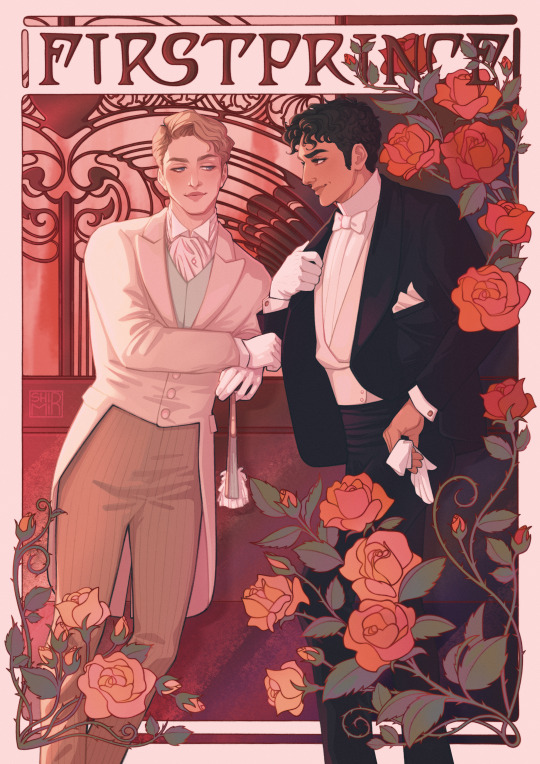
Flirt 🌹
———
Happy #5YearsofRWRB ❤️🤍💙 5 years since what is now my comfort book, and story, and characters have been introduced to the world! I joined in late but I’m happy to be here now ❤️
Here’s my piece for the RWRB Classics Zine, a free digital zine you can find on our twitter page 🫶
(Based on “Flirt” by Alfons Mucha, who is my number one fav artist of all time. I just replaced the flowers with the yellow rose of Texas and the red rose of England)
#red white and royal blue#rwrb#rwrb movie#rwrb fanart#rwrb book#alex and henry#alex x henry#alex claremont diaz#acd#henry fox#prince henry of wales#henry fox mountchristen windsor#firstprince fanart#firstprince#art#my art#fanart#artists on tumblr#illustration#art nouveau#alphonse mucha#alfons mucha
2K notes
·
View notes
Text
I made a little RWRB zine based on the movie! All illustrations done by me :) A zine is a short book which can be informative, a story or anything
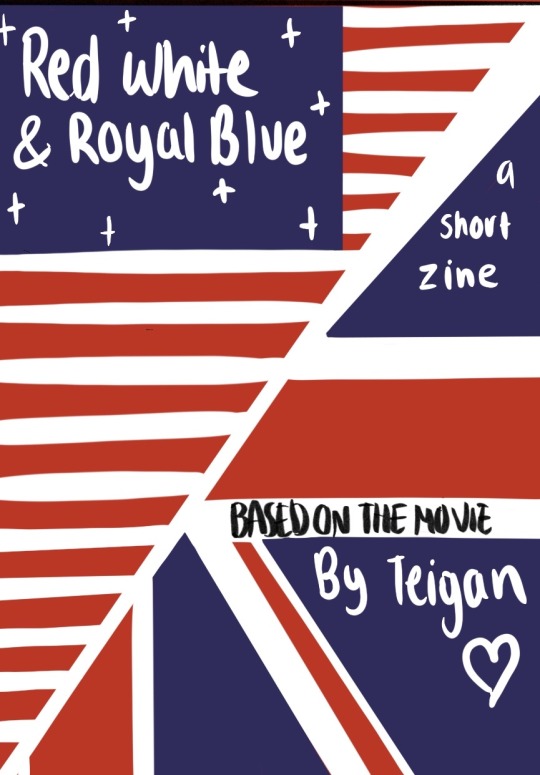

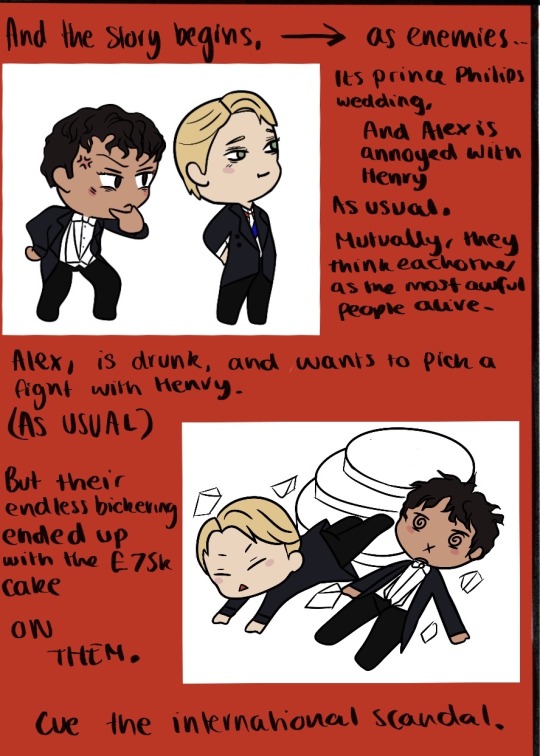

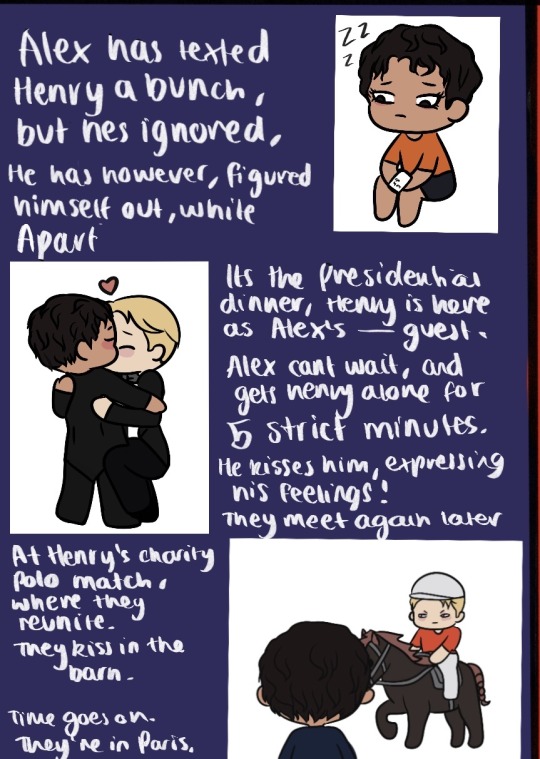



#red white and royal blue#red white and blue#alex and henry#rwrb movie#rwrb#prince henry rwrb#rwrbedit#rwrb fanart#rwrb book#rwrb alex#alex claremont diaz#rwrb fic#historymakers#prince henry
486 notes
·
View notes
Text

spy!firstprince for the RWRB Spy Zine!!!
Currently doing a redesign of it rn with an actual designer bc the first one was done by me with google slides and a dream
#4rthurfox#firstprince#red white and royal blue#rwrb#illustration#digital art#artists on tumblr#alex claremont diaz#henry fox mountchristen windsor#alex x henry#cmq#rwrb fanart
603 notes
·
View notes
Text
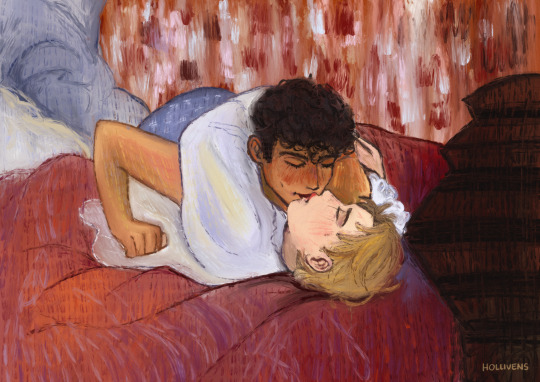
The Kiss (1893) by Henri Toulouse-Lautrec
My piece for the incredible RWRB Zine (you can find everything about it and the previous zine here !)
#illustration#procreate#artists on tumblr#digital art#red white and royal blue#rwrb#rwrb fanart#alex claremont diaz#henry fox mountchristen windsor#casey mcquiston#firstprince
298 notes
·
View notes
Text
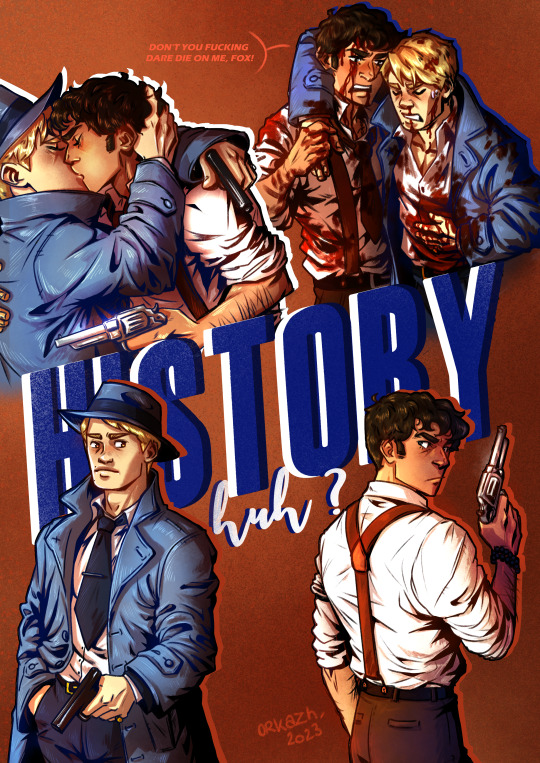
History, huh?
1940s, NYC.
Alex Claremont-Diaz already made history when he became his team's first POC agent. Now he aims to be the very best.
Sadly, that position is already taken by his archnemesis, Mr. Henry Fox.
So what happens when they have no choice but to team up on a highly sensitive mission? 🤲
- My contribution to the RWRB Spy Zine (@rwrbspyzine on Twitter) ✨
Check it out if you haven't already! So many lovely and passionate artists participated in it and I'm very happy I got to be part of it!!
#rwrb#rwrb movie#red white and royal blue movie#rwrb fanart#alex x henry#henry fox mountchristen windsor#prince henry#red white and royal blue#first prince#alex claremont diaz#henry fox#firstprince#acd#acd rwrb#henry rwrb#nick galitzine#nicholas galitzine#tzp#taylor zakhar perez#would you read that fic??#i love the film noir aesthetic so i had to do something about it!!#it's something about Alex in suspenders and Henry with that kind of hat....#yeah.
430 notes
·
View notes
Text
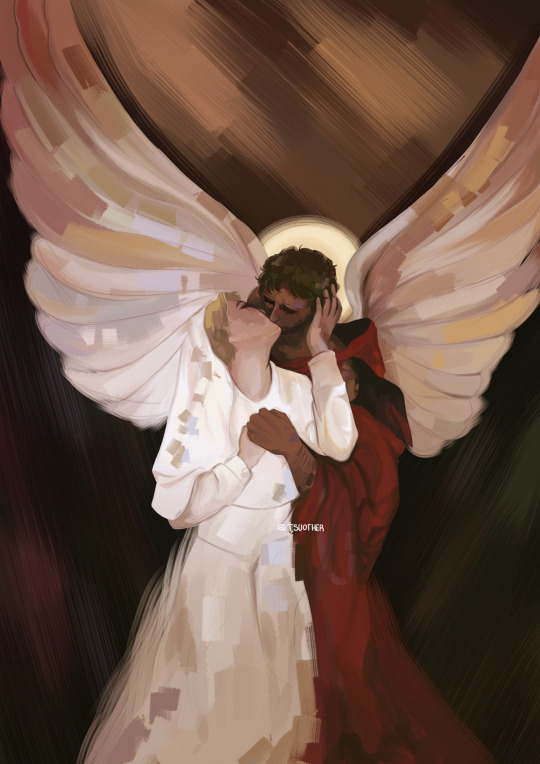
Happy 5 Years of RWRB everyone! My piece from this amazing zine: RWRB Classics over on twt! It was a honor to be part of this project with so many amazing artist!
The other side (1918)
Please reblog, don’t repost :)
#my art#red white and royal blue#rwrb#firstprince#alex claremont diaz#henry fox mountchristen windsor#5 years of rwrb#happy aniversary!!!
83 notes
·
View notes
Text

Happy 5 years of RWRB❤️ My contribution to our Classics Zine The H&A Museum ❤️ Check out all the gorgeous artwork!
Inspired by J.C. Leyendecker
#firstprince#rwrb#rwrb fanart#henry fox mountchristen windsor#alex claremont diaz#firstprince fanart#henry fox
146 notes
·
View notes
Text
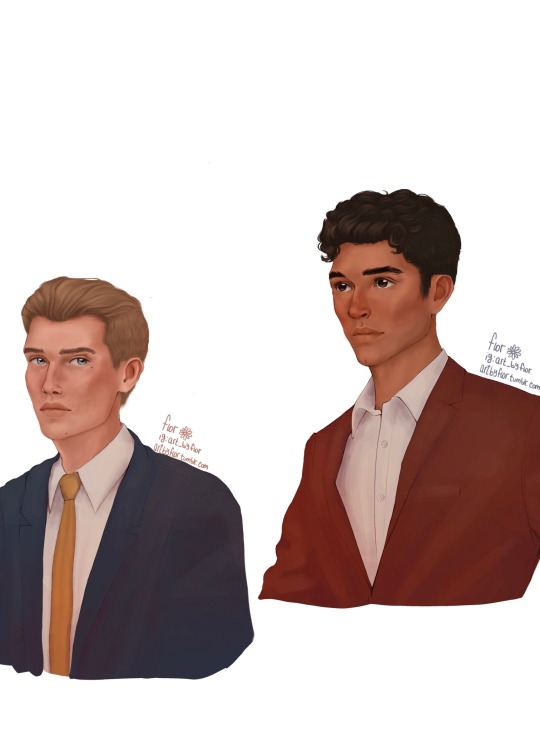
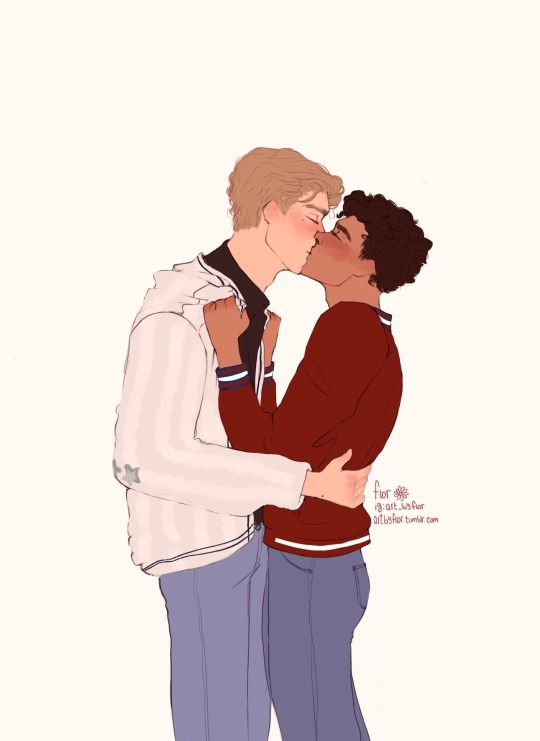
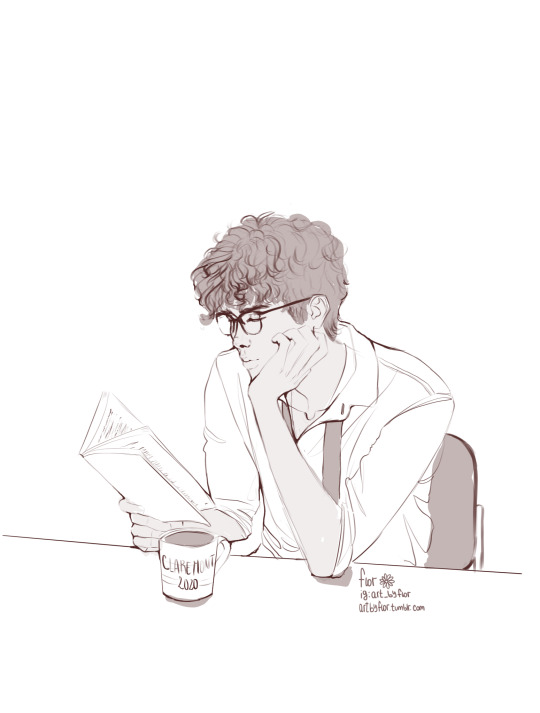

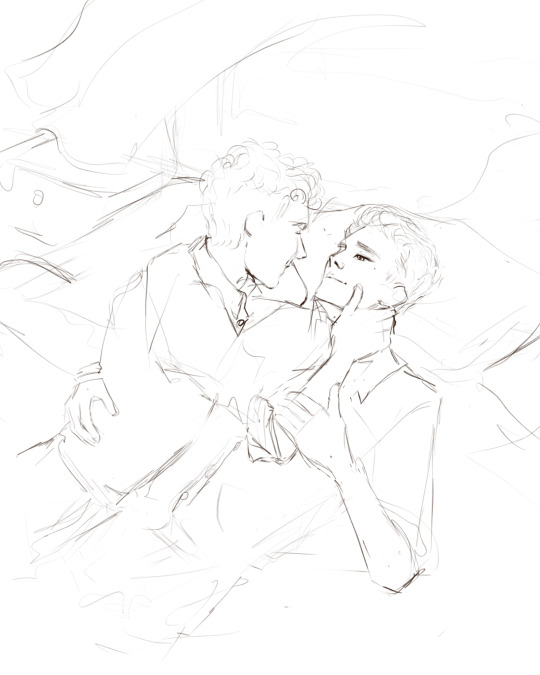

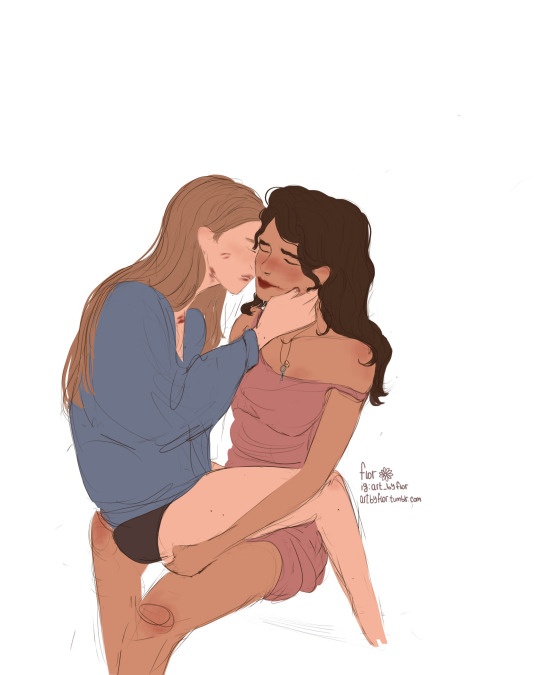
happy Red White and Royal Blue day to those who celebrate! ❤️🤍💙
i come back from a long an unexpected hiatus with a dump of some of the works i've done in private during this time to celebrate the RWRB Movie❤️
captions for each drawing under the cut!!
in order:
1. portraits of alex and henry (done almost two years ago, previous to the casting!)
2. self indulgent first-prince sketch (yes, i made henry a swiftie. no, i wont elaborate)
3. sketch of alex being a stressed law student
4. alex and henry being victims of me trying different outfits combinations and textures
5. very rough sketch of some firstprince fluff. i might finish it in the future!
6. a work of the VA museum scene i did for a zine back in the days! i never posted it, but if you've got the zine (@ourfavoritescene_zine ) you might have seen it!
7. last but not least, some genderbent firstprince, because why not! long live sapphics
#red white and royal blue#rwrb#firstprince#alex claremont diaz#henry fox mountchristen windsor#my art
214 notes
·
View notes
Text
Way back when a few months ago, I mentioned that the Chinese fan translation of Taylor's name 忒樂 meaning "really happy", which is adorable and fits him pretty well
Never got around talking about Nick's name's translation, but since I'm translating a couple of Chinese rwrb fan content, I might as well share this too lmao
The official translation of Nick's name is 尼古拉斯 · 加利齊納 which is weird to me because the pronunciation is not that similar:" Ni Gu La Si · Jia Li Qi Na." In English, it ends with "zine", a close-mouth sound, but in Chinese the same syllable is translated to "na", an open-mouth sound. What the fuck.
So most of the fans when talking about Nick for most of the time, say fuck that and use a translation they made up: 妮寇拉 嘎了心 Ni Kou La Ga La Xin, which sounds a lot closer to his actual name, but also is fun when you look at the meaning of the characters
So to start with his first name Nicholas:
妮 Ni: young girl
蔻 Kou: Caradom
啦 La: just a sound/expressive sound
The thing is, this ends up sounding more like "Nicola", or they sometimes simplify it to only the first two character so it's "Nicole", than "Nicholas", which is the Chinese equivalent of calling him "baby girl"
But the fun comes with his surname: see, 了 Le is a word to indicate past tense, and 心 Xin means heart. But 嘎 Ga, the first character, is originally just a character for the sound ducks make but recently developed into slang meaning "killed/died/cut off"
So Nick's surname literally translates to "killed your heart", which after translated, is closing to the meaning of "heartstopper" in a romantic sense, like you're so pretty you made my heart stop and killed me
So Nick's Chinese Fan Translation Name
Means
Babygirl - You made my heart stop
Which, hey, also suits him!!!
Gotta love me some wordplay :D
#rwrb#red white and royal blue#rwrb movie#nicholas galitzine#henry hanover stuart fox#henry fox mountchristen windsor#firstprince#rwrb thoughts#alex claremont diaz#rwrb rambles#meraki translates
56 notes
·
View notes
Note
Your art style is some of the most gorgeous I've seen omg it's always so ethereal and pretty!!! also down bad for your good omens au and the teaser you tweeted for the spy artbook. Super excited to see what you've cooked up! 💕‼️
Omg, you're so sweet! Thank you for your kind words. Oh yeah, I, too, am excited for the rwrb spy zine. It took me a week to finish the piece and I can't wait to share it in public. :D

111 notes
·
View notes
Note
🥑☁️🐝🎨 please.💜
🥑 ⇢ you accidentally killed somebody, which mutual(s) do you text for help?
I'd get in touch with @cha-melodius for her anatomical knowledge (y'know, maybe I can resuscitate whoever it is?) and @happiness-of-the-pursuit for his legal expertise, in the likely event that the resuscitation doesn't work.
☁️ ⇢ what made you choose your username?
You know, I've had this username since about 2010, and I honestly can't remember the backstory. I'm fairly sure it has something to do with some sort of arts and crafts project and then-untreated ADHD, though...
🐝 ⇢ tag your biggest supporter(s) and say one nice thing about them
This might get long, so I'll come back to this one and toss it under a jump. 🤣😅
🎨 ⇢ link your favourite piece of fanart and explain why you like it
You know, prior to the latest RWRB zine being published, I wouldn't have been able to narrow it down to just one, but this JC Leyendecker-inspired piece by @artofobsession is possibly my favorite piece of fanart that's ever been created. It's just -- even nearly a month after it was first posted, it causes beauty aggression in me and I just want to bite it because it's so pretty and glowy and ethereal and lovely and they're just so blushy and so into one another. It's the first fanart print I've ordered in years, and it's going to go on my wall of ephemeral pretty things with my Lindsay van Ekelenburg art and my various tarot card prints from Kickstarter decks.
[Send me emoji from the Writers Truth & Dare Ask Game and I'll answer the corresponding questions!]
Aight, back to 🐝 ⇢ tag your biggest supporter(s) and say one nice thing about them
I mean, obviously I'm tagging you first, @ad-astra13, because you're the Most Excellent of Doc Gremlins and your flailing in my Google Docs has been so, so motivating. Your fiber work is really cool and creative! I'm always intrigued to see which project you'll take on next.
And then there's @hgejfmw-hgejhsf, who even with a bunch of stuff going on IRL still takes the time to DM me a screenshot when someone has recced one of my fics, which -- warm fuzzies just everywhere. Val is one of the sweetest, most deeply passionate RWRB fans I have ever met, and her encyclopedic knowledge of all things book and movie have come in handy on like, dozens of occasions in the few months since I've gotten to know her.
@kiwiana-writes and I basically have the same brain in different bodies on different continents, the vibe is so consistent. Half the time I read his work it feels like it could've emerged from my brain instead of his, and now it turns out he's a pretty gifted songwriter too? Incredible, awe-inspiring, iconic, etc.
@artofobsession and I have a Spider-Man meme thing going on where I yell at Hann about their art, and they yell at me about my writing, and it's just a never-ending cycle of yelling. Pretty amazing to consider that I was Too Scared To Say Hi ™️ for awhile there, because I'm a big ol' introvert. Regardless of what Hann's got going on, I've never read an unkind word that's emerged from their keyboard, and they're super well-spoken and yeah, really glad I started making unhinged bulleted lists of art reviews as a way to break the ice, because they're good people.
Speaking of Spider-Man memes, @seanchaidh7 and I have also been Spider-Manning back and forth these last few months. She's created some really, really incredible art for my Big Giant AU, and just genuinely seems like a cool person. I'm happy we stumbled across each other in this fandom!
@duchessdepolignaca03 is one of the best unhinged idea riffers I've met. She deserves at least partial credit for the idea for my RBB fic, because a simple "fic where [x]" message can lead to a thread of dozens (or hundreds) of messages back and forth just flinging ideas out there to further the prompt. Half the time the riff is all that happens, but occasionally, the riff spawns something way bigger.
And there are folks who either I haven't found on Tumblr, or who left Tumblr behind in like 2013 and haven't looked back -- super grateful for everyone who's enabling my weird little brain to do the thing!
10 notes
·
View notes
Note
Hey!! Really excited about this project! I just wanna know if the mods have any past zine experience?
Hi!
Mod Roy/nightmareinfloral, our head mod, has experience on the joey zine right now and also having worked as a contributor on zines in the past. He also has relevant experience running large projects similar to a zine in his personal life.
Mod Tb/tbcanary, our design and production mod, has some experience moderating small free/digital-only zines as part of zine jams, so not large fandom zines like this, but still coordinating on a deadline and organizing and such.
Mod Red/sinhal, our social media mod and myself, was a mod on the Kory zine, and I have also, by myself, modded two big bangs and several weekends.
Mod Beck, our organization mod, has experience running other fandom events like the RWRB Big Bang and have experience contributing to several different fan zines, along with taking several zine making classes in college.
Mod Mari/thequiver, our writing mod, has been a writing mod on two zines and a contributor to one, as well as being the founder of Arrowfam week and one of the mods for the Non-Bat DC Union.
Mod Void/pinkcomputervoid, our art mod, personally does not have fanzine experience, but does have some contribution experience. In his personal life he's curated for a small scale fashion online magazine alongside other projects.
8 notes
·
View notes
Text
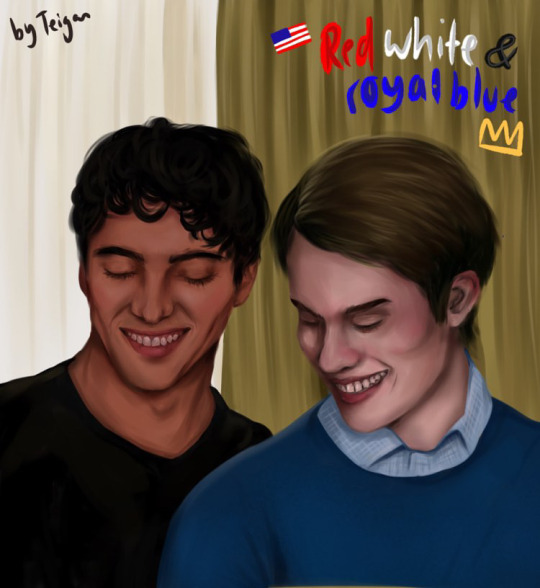
A recent drawing I did of one of the rwrb scenes in the film!!
Thank you for all the support on my zine, it means the world
I hope u like my drawing!!!
#red white and royal blue#taylor zakhar perez#nicholas galitzine#rwrb#firstprince#red white and blue#alex claremont diaz#prince henry rwrb#rwrb alex#rwrb book#alex and henry#henry fox mountchristen windsor#alex x henry#red#rwrb fic#rwrb fanart#rwrbedit#rwrb movie
74 notes
·
View notes